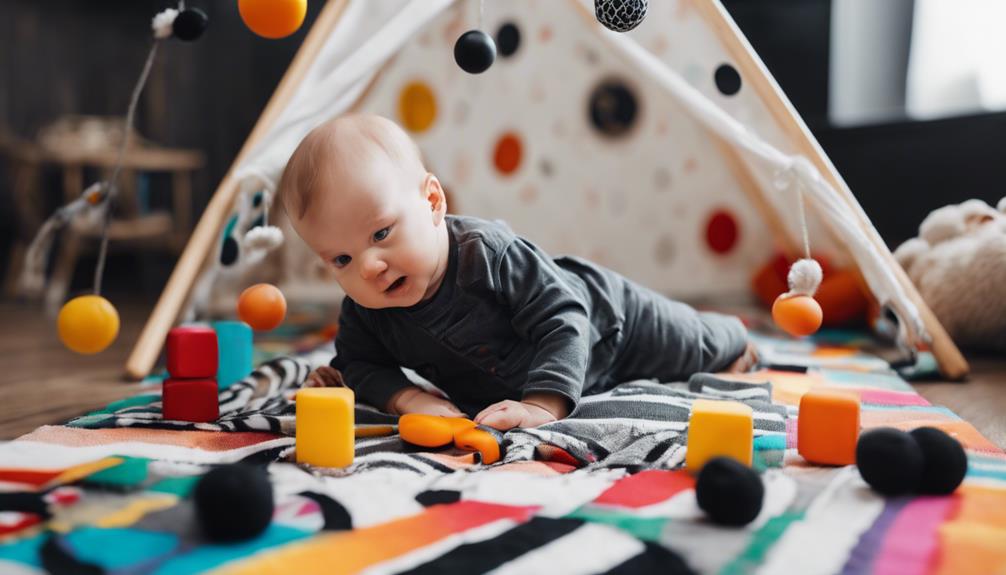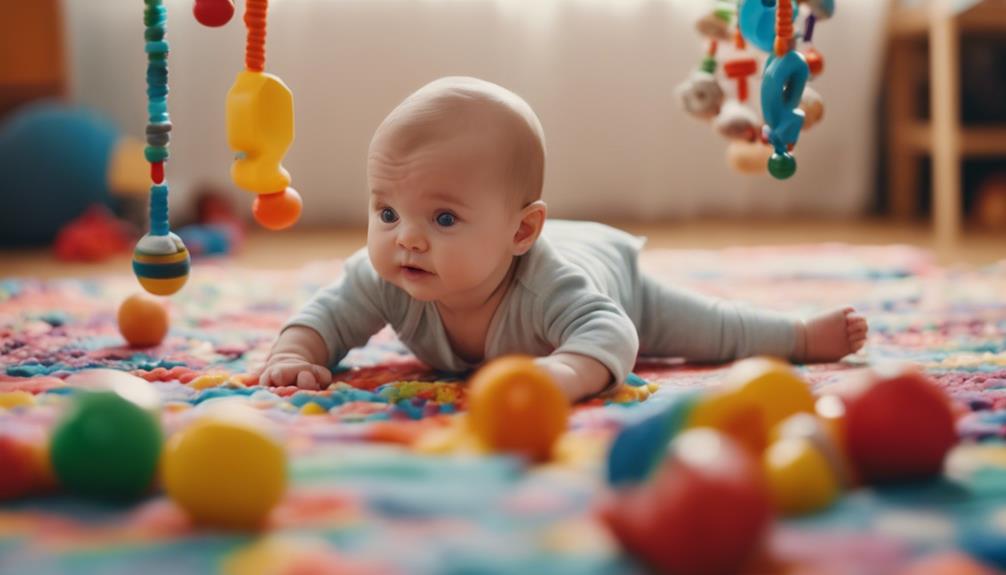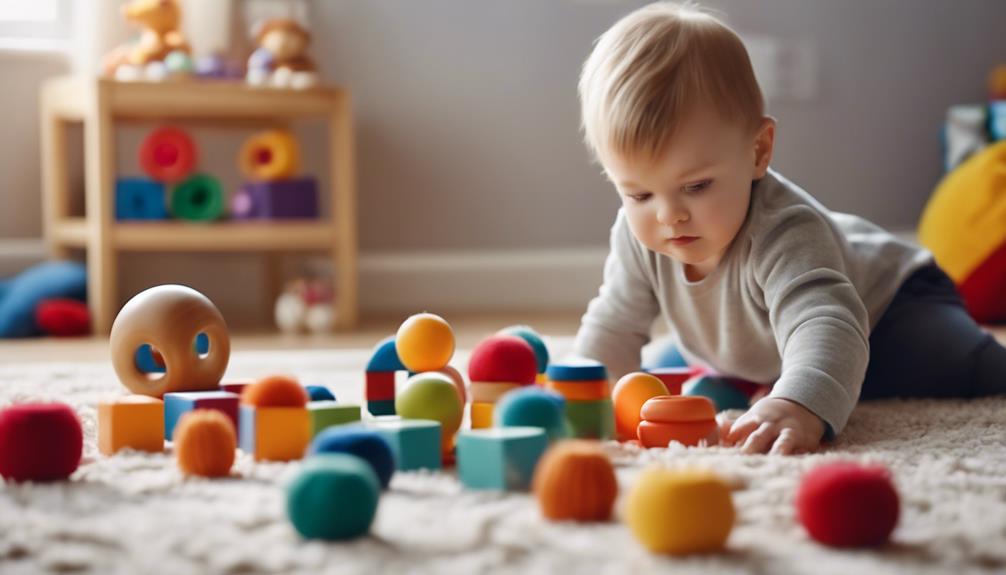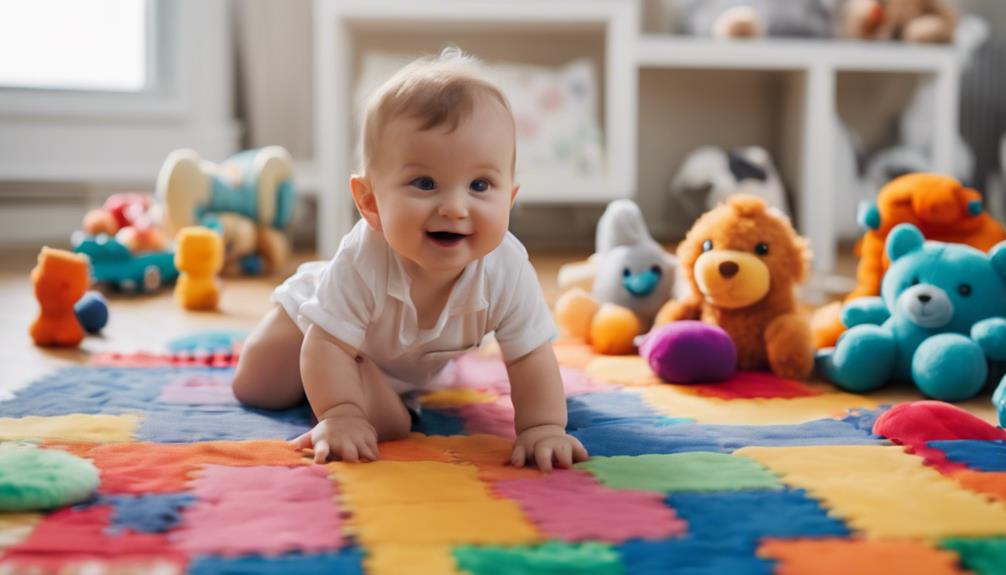Engage your infant in a variety of activities to encourage their development and growth. For newborns, consider using gentle rocking to strengthen the bond. When they reach one month old, introduce high-contrast patterns to stimulate their vision. Between 2-3 months, talking and toys can help develop their language skills and auditory senses. As they grow from 6-12 months, sensory play and music can enhance their coordination. For toddlers aged 12-18 months, focus on fine motor skills and creativity. Interactive games can also improve cognitive and social skills. Sensory play is beneficial for their senses and cognitive abilities. By incorporating these activities, you can effectively nurture your baby’s overall development. Further tips are available to help optimize your child’s growth and skills.
Key Takeaways
- Engage in interactive games to foster cognitive and social skills.
- Incorporate sensory play for fine motor skills and cognitive development.
- Use music and movement activities to boost coordination and language skills.
- Encourage tummy time for physical development and muscle strengthening.
- Provide high-contrast patterns and gentle sounds for visual and auditory stimulation.
Newborn Activities
Engage your newborn in simple activities like gentle rocking to soothe them and promote bonding during their early stages of development. Newborns, who sleep an average of 14-17 hours a day in short segments, benefit greatly from these calming interactions. Their vision, limited to objects about 8-10 inches away, makes close contact essential for their cognitive and emotional growth. Swaddling and holding your newborn close provide comfort and security, aiding in their overall development.
Activities such as gentle rocking not only soothe your newborn but also help in establishing a strong bond between you and your baby. Skin-to-skin contact is another vital activity that helps regulate their temperature and promotes breastfeeding. These simple yet powerful interactions play an important role in laying the foundation for your newborn's growth and well-being.
Activities for 1 Month Old

Your 1-month-old baby is starting to show early signs of development through smiling and making cooing sounds.
To aid in their growth, engaging in visual stimulation techniques with high-contrast patterns and bright colors can captivate their attention.
Additionally, incorporating tummy time exercises will help strengthen their neck muscles and advance their motor skills.
Visual Stimulation Techniques
Enhance your 1-month-old's visual development with high-contrast black and white patterns and simple, bold images. These visual stimulation techniques are essential for your baby's growing eyesight and cognitive abilities.
Here are three ways to engage your little one effectively:
- Use high-contrast black and white patterns:
Opt for toys, books, or even homemade cards with bold black lines on a white background to captivate your baby's attention. These patterns help stimulate their visual receptors and enhance their focus.
- Introduce simple, bold images:
Incorporate images of basic shapes like circles, squares, and triangles to aid in visual tracking and recognition. These uncomplicated visuals are ideal for your baby's developing vision.
- Utilize contrasting colors:
Mobiles or toys with bright, contrasting colors can aid in distinguishing different shades and hues. This exposure to varied colors can enrich your baby's visual perception and stimulate their neural connections effectively. Remember, a well-lit environment is essential for the best visual stimulation at this age.
Tummy Time Exercises
Strengthen your 1-month-old's neck muscles through tummy time exercises, an important activity for their early development. Tummy time plays a vital role in achieving developmental milestones and promoting motor skills in babies.
Begin with short sessions of tummy time, gradually increasing the duration as your little one becomes more comfortable and stronger. This exercise not only helps prevent flat spots on the baby's head but also encourages neck muscle development.
During tummy time, place colorful toys or mirrors in front of your baby to stimulate reaching and provide visual engagement. This encourages your baby to lift their head, promoting stronger neck muscles.
Remember, supervision is key during tummy time to make sure your baby's safety and comfort. By incorporating tummy time exercises into your daily routine, you're setting a strong foundation for your baby's physical development and motor skills.
Enjoy this bonding time with your little one while supporting their growth and well-being.
Sensory Play Ideas
Explore sensory play ideas for your 1-month-old to stimulate their developing senses and promote early engagement with the world around them.
Here are some activities to help your baby's sensory development:
- Soft Textures: Provide your baby with different soft fabrics to touch and feel, such as a smooth blanket or a plush toy. These textures can help in sensory exploration and tactile stimulation.
- Gentle Touches: Engage your baby with gentle touches on their skin, like softly stroking their arms or gently massaging their feet. This can promote bonding and sensory awareness.
- Light and Sound Stimuli: Introduce subtle light patterns or soft sounds like gentle music or nature sounds to captivate your baby's developing senses. These stimuli can help in stimulating their auditory and visual senses at this early stage.
Engaging in sensory play with your 1-month-old can create meaningful interactions and support their sensory development in a nurturing way.
Activities for 2 Month Old
What activities are beneficial for a 2-month-old's development?
At 2 months old, babies are beginning to explore the world around them. Engaging in activities that involve talking, singing, and reading can help build your baby's language skills. Encourage your little one to track moving objects to enhance their visual abilities. Providing toys that make gentle sounds can stimulate their auditory senses, aiding in their sensory development.
Additionally, offering plenty of tummy time is vital at this stage. Tummy time not only helps to strengthen your baby's neck muscles but also promotes motor skills development. It's essential to supervise tummy time to make sure the baby's safety.
Activities for 3-6 Months

Engage your baby in simple activities like talking, singing, and using playmats to support their sensory and cognitive development between the ages of 3 to 6 months. These activities are vital for nurturing your little one's language skills, fine motor skills, and overall growth during this exciting stage of development.
Here are three play ideas to incorporate into your routine:
- Tummy Time Fun: Encourage tummy time to help your baby strengthen muscles and develop head control. Use colorful toys or mirrors to keep them engaged during this essential exercise.
- Grasping Games: Provide safe toys that your baby can grasp and explore with their hands and feet. This will help enhance their fine motor skills and hand-eye coordination.
- Interactive Singing: Sing songs with motions and engage in playful activities like tracking moving objects. These interactions stimulate visual and auditory development while fostering a strong bond with your baby.
Activities for 6-12 Months

As your baby enters the 6-12 months stage, engaging in sensory play can help them explore different textures and stimulate their senses.
Tummy time benefits are essential during this period as it supports your baby's physical development and strengthens their muscles.
Introducing music and movement activities can also foster your baby's coordination and rhythmic skills at this age.
Sensory Play for Infants
Sensory play activities for infants aged 6-12 months are essential for stimulating their developing senses of touch, sight, and sound. Engaging in sensory play allows infants to explore the world around them in a hands-on manner, aiding in their cognitive development.
Here are three sensory play activities that can help infants in their sensory exploration journey:
- Texture Exploration: Provide infants with various textured objects like soft fabrics, rough sandpaper, or bumpy toys to touch and feel. This activity helps them distinguish between different textures and enhances their tactile sensitivity.
- Water and Sand Play: Allowing infants to play with water and sand can be a delightful sensory experience. The sensation of wetness, the movement of water, and the texture of sand can captivate their senses and encourage exploration.
- Sound Discovery: Introduce infants to different sounds such as musical toys, rattles, or nature sounds. This activity not only stimulates their auditory senses but also helps them recognize and differentiate between various sounds in their environment.
Tummy Time Benefits
Enhance your baby's neck, back, and shoulder muscles with tummy time activities designed for infants aged 6-12 months. Tummy time plays a vital role in promoting motor skills and physical development in your little one.
By encouraging your baby to spend time on their tummy, you're helping them build the necessary muscles to support their head, back, and eventually aid in crawling and walking. Additionally, tummy time can prevent flat spots on the baby's head, a common concern in infants.
You can incorporate short tummy time sessions throughout the day to gradually increase your baby's tolerance and strength. This activity not only improves coordination and balance but also contributes to your baby's overall physical development.
Music and Movement
Engage your 6-12 month-old baby in music and movement activities to boost their coordination, balance, and motor skills. These activities not only enhance physical development but also contribute to their language development and rhythm recognition.
Here are three ways to incorporate music and movement into your baby's routine:
- Sing and Dance Together:
Singing songs and dancing with your baby can help them recognize patterns in music, improve language skills, and develop a sense of rhythm.
- Clap Along to Music:
Encourage your baby to clap along to music to enhance their fine motor skills and hand-eye coordination while enjoying the beat.
- Explore with Musical Instruments:
Introduce simple musical instruments like shakers or drums to stimulate your baby's auditory senses, promote exploration, and create a fun musical experience together.
Activities for 12-18 Months

Introducing your little one to interactive games and play is crucial for fostering their overall development between 12 to 18 months of age. During this stage, it's important to build your baby's skills through various activities that encourage exploration and learning.
Engage in stacking activities to enhance their fine motor skills and hand-eye coordination. Introduce sensory play with materials like water, sand, or textured objects to stimulate their senses and encourage curiosity.
Encouraging role-play and imaginative play can help stimulate creativity and language development in your little one. Explore outdoor activities such as swinging and nature walks to promote physical development and foster their curiosity about the world around them.
Reading books together is also a great way to encourage language development, cognitive skills, and strengthen the bond between you and your baby. By incorporating these activities into your daily routine, you can support your baby's growth and development during this critical 12-18 month period.
Interactive Games

During the important developmental stage of 12-18 months, interactive games play a significant role in fostering your baby's cognitive, social, and sensory skills. Engaging in play not only provides entertainment but also serves as a powerful tool for your little one's growth.
Here are three ways interactive games can benefit your baby:
- Enhancing Cognitive Skills: Interactive games help stimulate your baby's brain, encouraging problem-solving abilities and memory retention. Activities like shape sorting or simple puzzles can aid in developing these essential cognitive skills.
- Promoting Social Interaction: Through games that involve turn-taking or imitation, your baby learns valuable social skills such as communication and cooperation. These interactions lay the foundation for future relationships and social development.
- Improving Motor Skills: Interactive games are excellent for enhancing your baby's motor skills and coordination. Activities like stacking blocks or playing with toys that require grasping and releasing movements can help your baby develop these vital physical abilities.
Incorporating interactive games into your baby's routine can have a profound impact on their overall development, making playtime not just fun but also beneficial for their cognitive, social, and motor skills.
Sensory Play

Sensory play involves activities that stimulate a child's senses, providing valuable hands-on experiences for infants and toddlers. Engaging in sensory play can have a significant impact on a child's development. By exploring different textures, colors, and sounds, children can enhance their fine motor skills and cognitive abilities. These developmental activities also play an essential role in language development, as children learn to associate words with sensory experiences.
Common sensory play materials, such as sand, water, play dough, textured objects, and musical instruments, offer a diverse range of stimuli for young children to engage with.
Through sensory play, children can't only boost their creativity and problem-solving skills but also improve their emotional regulation. Encouraging sensory play in daily routines can provide children with a fun and enriching way to learn about the world around them while fostering essential skills for their overall development.
Frequently Asked Questions
What Activity Is Key to All Areas of an Infant's Development?
Tummy time is the key activity for all areas of your infant's development. It strengthens muscles, improves motor skills, enhances sensory experiences, and lays the foundation for future milestones. Regularly engaging in tummy time supports your baby's growth and development.
What Is One Activity You Plan on Doing to Help Your Baby's Development?
You plan on incorporating sensory exploration activities like playing with textured materials to stimulate your baby's cognitive development. It's a fun and engaging way to help them explore their senses and learn about different textures.
How Do You Play With a Baby for Development?
To nurture development, interact with your baby through play. Engage in activities like peekaboo for sensory awareness, sing songs for language skills, and encourage exploration. Let the fun flow, and watch those little minds grow!
What Does Playing With Babies Teach Children?
Playing with babies teaches you about empathy, social skills, fine motor skills, cause and effect relationships, creativity, imagination, and language development. Engage in interactive play to enhance your understanding of these key aspects of development.
Conclusion
In summary, engaging in developmentally appropriate activities with your baby is essential for their growth and learning.
Just like a garden needs nurturing to bloom, your little one's brain needs stimulation to thrive.
So, whether you're playing peek-a-boo with a newborn or building blocks with a toddler, remember that these simple activities are laying the foundation for their future success.
Keep playing, keep bonding, and watch them blossom into amazing individuals.










